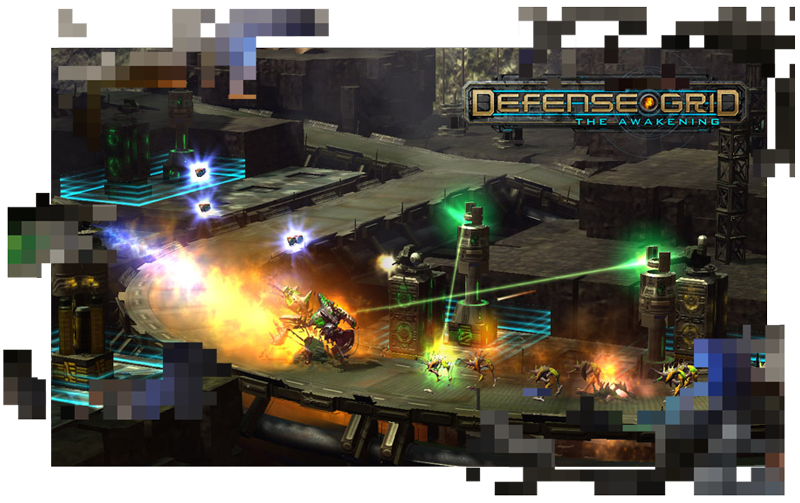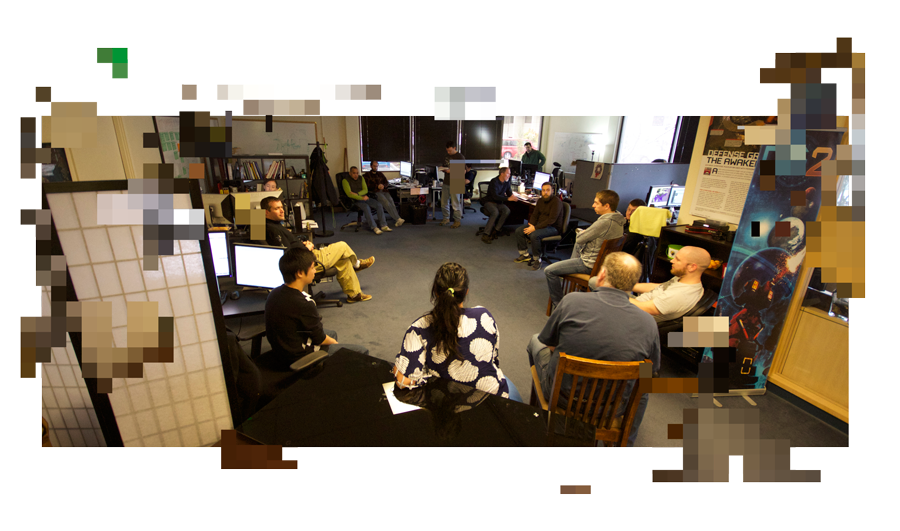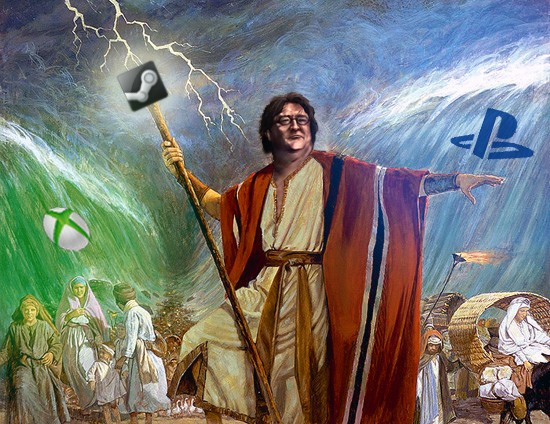- Joined
- Jan 28, 2011
- Messages
- 97,490















http://www.polygon.com/features/2014/3/6/5465976/defense-grid-2-console-port
WHEN A SUCCESSFUL GAME IS A FAILURE
By Russ Pitts @russpitts
on March 06, 2014 at 10:00a
An inside look at the business of games, and how Hidden Path struck a deal to bring Defense Grid 2 to consoles.
The founders of Hidden Path Entertainment tell the story now only rarely. It's hard to get it out of them. In fact, in almost a year of building trust, conducting closed-door interviews, attending all-access meetings and spending hours on site at Hidden Path Entertainment's Bellevue, Wash. headquarters, it's the one thing that they haven't offered to share with me — until now.
I've been reporting on the development of Hidden Path's Defense Grid 2 since April of 2013. I've read all of the design documents and industry reports. I've interviewed every member of the Defense Grid 2 team. I've been in rooms where even certain members of that team aren't allowed. And yet, month after month, the story of what exactly happened with the launch of the original Defense Grid has eluded me. They've simply not wanted to talk about it — on or off record.
Part of why the founders don't tell this story relates to the business of making video games itself. A game that doesn't ship isn't always a failed game. Technology can be retooled, assets redirected, entire ideas shelved and then resurrected years later. The work put in on one game may lead to new work on something else, bigger or better. What's worse, a game that does get shipped doesn't always make money. Sometimes they cost so much to make they never make that money back. Sometimes game development is just spinning your wheels, waiting for the big hit that almost never comes. Some studios lumber on for years, making games, releasing them, losing money, until inevitability eventually catches up to them and they die. That's the business of making games.
Many of the best stories in this industry don't ever get told — the true stories of why studios fail, how people lose jobs or gain them. How certain games get made — or don't. Those stories are too harmful to tell because this is business, and there are reputations to protect. Even when a game or a studio fails, the people involved might still find another job. And the people who screwed them before might be the ones now paying the bills.
This is one of those stories. It involves two big companies and one little one. It involves a deal gone bad and a partner that couldn't be relied upon. It's the story of how Defense Grid almost went into the coffin before it ever saw the light of day and the machinations at the highest levels of the industry that conspired to close the lid. It's about a last minute save and a triumph that ultimately came at too great a cost.
And the most extraordinary thing about this story is that it's not extraordinary at all. This story could be about almost any game you've ever played and several hundred you never will. It is a glimpse into the fickle world of business and politics that simmers underneath the buzz and excitement of making video games. It is the dark, very human and ultimately political underbelly of the business of making fun.
This is game development.
PROLOGUE: THE STORY OF DEFENSE GRID
Defense Grid was dead. That was the message, delivered by Microsoft in the summer of 2008, just a few months before the game's planned release.
Hidden Path had poured all the money it could spare into a small project to make an original game: Defense Grid, a downloadable sci-fi tower defense title that it could call its own and that would prove Hidden Path was a company that knew how to make games.
It's what every developer wants to do. It's why people make anybody's games at all: to eventually make their own. And Hidden Path had struck out to do it right out of the gate. And it had almost worked.
The story begins in 2007, shortly after Jeff Pobst, Mark Terrano, Michael Austin, Jim Garbarini and Dave McCoy founded Hidden Path. It begins after they'd begun making Defense Grid and pitched the game to their contacts at Microsoft.
The founders had deep connections to Microsoft, so they pitched them a distribution deal: Hidden Path would make the game, Microsoft would distribute it on Xbox Live. For Microsoft, it was an easy sell. Microsoft, initially, loved the idea. The concept for the game was bold and brash. It was a downloadable title being developed for twice what downloadable titles normally cost to make at the time. The extra money was to be put into producing and polishing the game, potentially making it a premium offering for its Xbox Live lineup. Defense Grid, built by the men who worked at Microsoft's Advanced Technology Group and who made sure Xbox games played and looked better on Xbox than anywhere else, would be one of the most highly produced downloadables on Xbox.
Microsoft was hot for the game. It wanted quality games to announce at the 2007 Game Developers Conference as part of its then-new Xbox Live Arcade program. The problem: Hidden Path hadn't named the game yet. The working title "The Last Stand" had been taken by someone else. Hidden Path hadn't expected to need a name for months, but suddenly it had only weeks. Hidden Path scrambled, spent money and came up with Defense Grid. Maybe it wasn't perfect, but it worked. And it was theirs. And best of all, Hidden Path suddenly had a game in development for a flagship service on the best-selling console. With the increased attention and aggressive demand from Microsoft, the little studio, still in its first year of existence, felt like it had won the lottery.
For Microsoft, Hidden Path was just the sort of company to help promote Arcade — it was indie but comprised of veterans. Pobst had run a support department at the Advanced Technology Group at Xbox. Terrano had created Age of Empires 2. Austin also came from Xbox, and McCoy and Garbarini from the MechWarrior developer FASA. These five men threw their combined development expertise into one game:Defense Grid. It couldn't lose. It was planned for release in 2008. Everyone was excited. And then things changed.

The original Defense Grid was to be released in 2008 as an XBLA exclusive. That plan changed.
As big companies often do, Microsoft frequently moves its people around. It's called reorganization, and it's a way of both compensating for departed talent and ensuring that no one division ever becomes too dependent on any one person. It's a survival mechanism, and it can be effective. It can also be catastrophically destructive. New guys come, old guys go. It's the way of things — the circle of bureaucracy. But when old guys go, they leave behind projects still in the works. New guys like new projects, so they often clear the decks.
Shortly after a Microsoft reorg in early 2008, the "new team" called for a meeting with its partner, Hidden Path, to see the results of development on Defense Grid, which already had the green light from the "old team." Everything went right in this meeting with Microsoft. The game looked great, played great and was running on schedule. But a strange thing happened: According to Hidden Path, the more right things went, the more frustrated the Microsoft people became. The game, they eventually said, was too good. They'd wanted it to be bad. They'd planned for it to be bad. Now they didn't know what to do.
The games industry is a hit-driven business, and Defense Grid had indisputable potential for success, however modest. In fact, with its well-funded, highly-experienced development team, Defense Grid looked like a sure thing. But it was someone else's sure thing. The team at Microsoft that had backed it was no longer in power, and the new team wanted its own successes.
The new crew from Microsoft had come with orders to shut down Defense Grid. It was too similar, they said, to another game, one more dear to the new team leader's heart. Defense Grid was part of the old plan. The new guy had a new plan.Defense Grid had to go. But ... It was a great game. It was too good to cancel. Chaos.
THEY'D WANTED IT TO BE BAD. THEY'D PLANNED FOR IT TO BE BAD.
Microsoft suggested a compromise: Release the game in 2009 instead of 2008. The game that was almost finished. The game that had taken all of the money Hidden Path had set aside to create an original IP. The game it was counting on to sell in order to promote itself as a studio that could make its own games. The game in which it had invested the creativity and passion of its five, highly experienced veteran founders. Hidden Path had no choice but to accept the revised deal; it had no Plan B. But to push the game release back meant absorbing an additional year of overhead, which it couldn't afford. Suddenly the winning lottery ticket looked like an invitation to a funeral.
Hidden Path needed a way out. So it found one. And it didn't have to look far.
The original contract for distributing Defense Grid on XBLA prohibited Hidden Path from releasing the game on any other consoles for one year after the XBLA release — standard contract language. Microsoft wanted to protect its interest in the game. Defense Grid was guaranteed one of only a few "slots" during the summer of 2008 (then 2009) with the understanding that the game would be exclusive to Microsoft's console. What the contract didn't mention, however, was the PC.
According to the contract language, Hidden Path had every right to release Defense Grid on PC. After all, PC meant Windows, which meant Microsoft. Pobst remembers no one at Microsoft being concerned about a game released for Xbox Live Arcade also being released for the PC. But the people who wrote the contract with Pobst in 2007 were not the same people renegotiating it in the summer of 2008. And those people, the new team, just seemed to want Defense Grid out of the way.
Enter Valve.
Since 2003, Valve's Steam digital distribution service had been gaining ground on traditional retail sales. Bolstered by Valve's own games, the service began offering titles from additional publishers in 2005. By 2008, it was ready for prime time. Developers were flocking to the service, hoping digital distribution would be a more profitable alternative to the brick-and-mortar model dominated by retailers, major publishers and companies like Microsoft.
For Hidden Path, Steam wasn't just an alternative; it was a lifeboat. Pobst reached out to Valve. Valve responded favorably — and quickly. Valve wanted Defense Grid for Steam. Valve loved Defense Grid. And Valve wasn't screwing around. Valve sent over a contract. Hidden Path signed.Defense Grid was saved.
IT WAS A GREAT GAME. IT WAS TOO GOOD TO CANCEL. CHAOS.
For the next six months, Hidden Path would divert precious time and team members to porting Defense Grid to PC, re-writing the Xbox-native UI elements and turning the hastily created Plan B into Plan A. Meanwhile, the revised deal with Microsoft was coming to fruition. In 2009, as promised (the second time), Defense Grid was released on Xbox Live Arcade. It was not priced at $20 as the PC version had originally sold for, nor at $15 — the price Hidden Path had planned to discount the Steam version to match its $15 launch on XBLA. Instead, Microsoft unilaterally decided that a mere $10 was the appropriate price.
In the end, due to the unexpected development time to port the XBLA version to Steam and the final XBLA price point,Defense Grid made barely enough money to pay for its own development. Hidden Path had succeeded at making a game, but it had not achieved its goal of creating a franchise that would establish the studio as a major creative force.
The game that was a success was also a failure.
Hidden Path would struggle with further heartbreak, canceled projects and still more dubious partner relations until its incremental work with Valve on Counter-Strike: Source, Team Fortress 2 and Left 4 Dead 2 led to a development deal on what would become Counter Strike: Global Offensive in 2010.
Employees responsible for the Counter-Strike franchise at Valve played Defense Grid and told Pobst, "'You'd be good atCounter-Strike!'"
"That may be counterintuitive," Pobst says, "but if you look at what it takes to make Defense Grid, it's pretty similar in the balancing of the system to what it takes to make Counter-Strike work."
As for Defense Grid, it steadily accumulated fans, year after year. Against all odds, it became a cult hit on PC, with fans clamoring for more. Hidden Path launched a Kickstarter campaign to create a Defense Grid expansion pack. And that, in spite of successfully funding the expansion pack, is where a little hint of failure crept again into Hidden Path's success.
Because what Hidden Path really wanted, and what its fans really wanted, was a full sequel: Defense Grid 2. And although the expansion was funded, the total haul was close to a million dollars short of enough money to make a full sequel. To make the sequel happen, Hidden Path would need a straight-up injection of cash. And that's where a wild-eyed dot-com millionaire success story video game financier from Canada comes in.
FOR HIDDEN PATH, STEAM WASN'T JUST AN ALTERNATIVE; IT WAS A LIFEBOAT.
RESOURCES: BLAME CANADA
In spite of the successful funding of the Containment Kickstarter, the failure to hit full funding for a sequel left many backers with a bad feeling. Some felt cheated. After all, the Kickstarter was called "Defense Grid 2," but the sequel itself was merely a stretch goal. True, the expansion did provide an eight-level update to the original Defense Grid, with new characters voiced by Alan Tudyk from "Firefly" and Ming-Na Wen from "E.R.," but many backers wanted Defense Grid 2. They'd paid their money, the Kickstarter had succeeded, their credit cards were charged, but they were not going to get Defense Grid 2. They were confused. It's all about the messaging.
For Hidden Path's part, it felt it was clear enough about what was promised and what would be delivered, but it also knew some of its audience didn't agree. It wanted to make good on the spirit of the Kickstarter promise, which had somehow transmogrified in many people's minds into being about the sequel and not just the expansion. Plus, personally, many at the independent studio just plain wanted to make the game. It would be a sequel to the game that launched the studio. And if the developers had to struggle a little bit to get it made, well, Hidden Path had been down that road before.
Pobst talked to industry friends. The initial plan for a Defense Gridsequel would be to launch on Steam and then maybe on consoles, then perhaps on other devices. Hidden Path needed an infusion of cash to get that ball rolling. Pobst heard good things from Double Fine about an investor from Canada, a rare individual who'd made money elsewhere and was investing it in the games industry. Pobst decided to reach out. What did he have to lose?

The Defense Grid 2 team works out of a corner of the Hidden Path studio in Bellevue, WA.
"I wrote him a letter and I said, 'Hey. There aren't many people who are willing to invest in games. It looks like this is something you're doing. We've got a good team here. We're making, I think, a good product. Is this something you would be interested in?'" says Pobst. "He wrote me back within a few hours and he said, 'Look, I get about 200 of these a week. I ignore most of them, except the games that I know. I'm one of your backers.'"
Steven Dengler is the co-founder of an online currency trading company called Xe. He and his partner founded the company in Toronto in the mid-'90s, before trading currencies online was even a thing. Now, just after its 20-year anniversary, Xe is one of the largest currency trading websites in the world and Dengler is a millionaire nerd.
"I used to be what you would have considered in the '90s a hard-core gamer — I'm a collector of games now," Dengler says.
Finding himself with more money than he needed, Dengler turned, as many sudden millionaires do, to how he might dispose of it. His answer: Help people make things he might enjoy himself — and that meant, among other things, video games.
"For me to invest in video games is, I guess, a vote of my confidence in the — this is going to be an elitist term — the supremacy of that form of narrative over traditional narrative," Dengler says. "I love reading books. I love watching movies. But I love playing video games more, because they engage me emotionally more than a book or a movie.
"So I think that it's only reasonable that people like me show up and start putting money into things that are very real for them. They're not new or scary or theoretical. They're things that I've played my entire life."
Before speaking with Pobst, Dengler had not only heard about Defense Grid, but he had played it. His kids had played it. Pobst didn't know at the time, but Dengler was already invested, financially and emotionally. Getting him to kick in as a full investor was one of the easiest sell jobs of both their careers.
HIDDEN PATH NEEDED AN INFUSION OF CASH TO GET THAT BALL ROLLING
The two men exchanged emails, then phone calls, then met in person, played Hidden Path's newest game at the time,Counter-Strike: Global Offensive and generally nerded out. Then they talked business.
"We both got together, figured out what we wanted to do here, what my goals were, what their goals were, figured out a way to make that work, and then just went and did it," Dengler says. "I don't say this with any disrespect to [Pobst], but I really got the sense that if I didn't step up, this just was not going to happen. He'd been around the industry looking for money. He'd done the Kickstarter. It had raised some money, but not enough. OK. I liked the game. I liked the franchise. I wanted to see it continue."
Dengler and Pobst did what might seem like lunacy to business people, but for each of them, it just came naturally: They were honest with each other. Pobst outlined the deal he wanted to see and what he needed to make it happen. Dengler did the same. They agreed on almost everything. To say this never happens would be to dramatically understate the corrosive environment of traditional video game funding.
"Having done some angel investment for companies and watching those companies go through into actual negotiations with venture capital firms and private equity firms, you start to realize, sometimes venture capital firms will come in for 20 or 30 percent, and they'll want control of the company," says Dengler. "De facto control at the board level or something like that. And you're like, 'Oh my God, really?'
"You understand why they're doing it and you understand they have the ability to do it, but you're just like, 'Aw! Euuugh!' It just feels so wrong to me to be doing that. ... So you come and say, 'Look, your company's going under unless I put this money in, so I'm gonna make it as oppressive as I want.' I hate that, personally. I have an intense loathing for that sort of approach. But from a business standpoint, I understand why sometimes you make deals with the devil. [But] because I hate that, the last thing I would want to do would be to do that to somebody else."
In return for his investment (and humanity), Dengler will get one thing he wanted anyway and another potential thing:Defense Grid 2, and possibly some profit. In that order.
And then there's a bonus third thing, which he doesn't talk about, but which Pobst mentions quite a lot: helping evolve the game industry into something a little more sane.
"There is just no investor class in our industry," Pobst told me in April of 2013, the first time we met to discuss the making of Defense Grid 2. I had just learned of the Dengler funding. Without someone like Dengler, there would be noDefense Grid 2. And there is no one else like Dengler. "There are venture capitalists, but what venture capital wants to do is flip businesses. Their job is to find businesses of a certain valuation, typically invest in three or four of the kind they know about, push them all to try and be successful, and when one is successful and the three-year clock is coming to an end, they merge them all together and sell them to a larger group for a higher valuation. They only get money out then. ... Someday I hope, 10 years from now, there are enough people who have made money in this industry that they decide they want to invest in this industry, and that we actually have an investor class of angels who can afford enough to make products."
That would mean more people like Dengler. At the first meeting between Dengler and Pobst at Hidden Path's office, Dengler saw, in the small company lobby, the wall of game boxes representing games its founders and employees had made. He spotted Homeworld, which Pobst had been part of. Dengler nearly lost his mind with excitement.
"It's like one of my top five games of all time," Dengler says, his voice rising. He's like a kid again, the nerd from the '90s with hardly any money but plenty of time. It's clear he dropped some of that money and a great deal of time onHomeworld. "I was getting into it with them and telling them my favorite moments with the game. [Pobst] was getting a little embarrassed, like, 'I don't remember that part' ... [Dengler laughs] 'I do! I do!' I remember when the mining ship came back as a battleship and it came into the middle of this firefight and said, 'This is the battleship, not the mining ship.' Battleship! And all the people are like, 'Holy shit, it's a battleship!' And you remember it. ... I'm very cognizant of the fact that when I was raised, I was the nerd. I was the outcast. I've been playing video games a solid ten years more than any of these other people. So give it five or 10 years and you'll start to see people coming off the business conveyor belt, being CEOs and things like that, for whom gaming really is just another thing ... they'll look back and say, 'Geez, this was a good opportunity for people to get in on this, and I'll be like, yes, it was!'"
Last edited:







![Glory to Codexia! [2012] Codex 2012](/forums/smiles/campaign_tags/campaign_slushfund2012.png)










